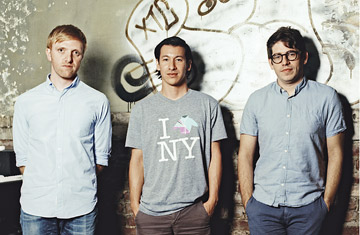
Kickstarter co-founders Charles Adler, Perry Chen and Yancey Strickler.
(2 of 5)
The crowd also turns out to be pretty talented at identifying and bootstrapping promising creative endeavors. Two Kickstarter-funded documentaries have been nominated for Academy Awards. Cards Against Humanity, a game whose versions dominate the top slots on Amazon.com's list of best-selling playthings, was originally financed through Kickstarter. In July, Publishers Weekly theorized that the site may have effectively become the second largest U.S. publisher of graphic novels.
So could Kickstarter and its crowdfunding competitors and imitators end up competing with venture capitalists, angel investors and other sources of funding for start-ups of all sorts? Entrepreneurs could use the help. In 2011, total U.S. venture-capital investments were off by more than 70% from their peak in 2000 right before the dotcom bubble burst. Good ideas are surely dying on the vine for lack of money.
Among the people who hope crowdfunding will come to the rescue is President Obama. In April he signed the JOBS (Jumpstart Our Business Startups) Act, which relaxes securities regulations in the interest of encouraging crowdfunded investment in companies of all sorts. Sometime next year, after the Securities and Exchange Commission has done due diligence, it should be possible for a site like Kickstarter to engage in a democratized form of venture capital, finding backers who will invest in start-ups in return for an equity stake.
Except it's not that simple. For one thing, Kickstarter itself has no interest in becoming a start-up factory. What its founders care about is helping creative people pay for one-off projects with a well-defined beginning and end--whether or not they have the potential to be profitmaking enterprises.
That passion originated with a question that Perry Chen, a musician and native New Yorker living in New Orleans, asked himself back in 2001, when he wanted to throw a late-night music bash to coincide with that city's jazz festival. "What if the audience could help fund this event?" he remembers wondering at the time. "If we could raise the funds necessary, great. If not, it just doesn't happen at all."
Chen didn't solicit money, and his event never happened. Still, the notion stayed lodged in the back of his brain. Years later, back in New York, he began working on the idea with music journalist Yancey Strickler and designer Charles Adler, who became Kickstarter's co-founders. The site debuted in April 2009 with Chen as CEO.
Today, despite the outsize impact it's having on multiple industries, Kickstarter remains a lean operation; it only recently hired its 42nd employee. Other numbers associated with the company are also smaller than you might guess. As I write, 3,508 projects are seeking funding on the site--a dinky, dinky number on a Web on which 350 million eBay listings are active at any given time.
By definition, the Kickstarter enterprises that get the most ink, such as Pebble and Ouya, are outliers. "The typical project raises five grand and is supported by 85 people," says Strickler. "So you can learn the first names of the people who got you started."
